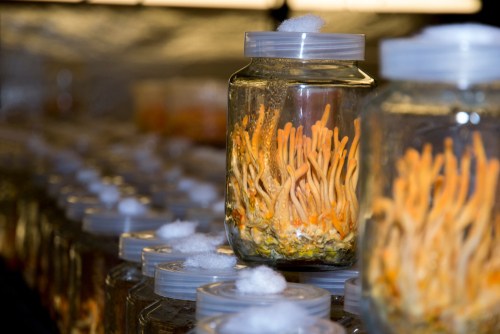Chula researchers celebrate the success of Active Targeting, a revolutionary innovation in the medical industry using bio–robots to deliver targeted cordyceps extract to halt cancer with reduced side effects.
Several studies from around the world have confirmed that Cordycepin extracted from cordyceps is a crucial active ingredient that kills cancer cells, but the problem is that the human intestine absorbs very little of this substance.
Dr. Teerapong Yata, Lecturer of the Biochemistry Unit, Department of Physiology, Faculty of Veterinary Science, and Dr. Waranyu Pooncharoen, Department of Pharmacognosy and Pharmaceutical Botany, Faculty of Pharmaceutical Sciences, Chulalongkorn University have collaborated with the National Nanotechnology Center (NANOTEC) to conduct a research to address this question through a delivery system aided by bio-robots to carry the “Cordycepin” to targeted cancer cells more precisely.

Dr. Teerapong Yata
Extraction of cancer inhibitors from cordyceps
Dr. Teerapong explained that taking cordyceps or cordyceps extracts, as they are sold and consumed today, may have benefits in terms of general health maintenance, but almost no effect in terms of inhibiting cancer cells.
“We have to extract the substance. “Cordycepin” and see how it can be brought to the cancerous tissue in the body, as the intestine can absorb very little of it. Therefore, NANOTEC has developed bio-robots called the “Nanoparticle Delivery System” to distribute the extract to the targeted location where we want the extract to be active.”
Bio–robots delivering extracts to treat cancer
The nanotechnology delivery system is one answer to the cancer treatment problem. By bringing the active substance to its target and helping the body absorb Cordycepin better, the delivery system also reduces the chance of drug residue and toxicity in the body.
“There is no definite conclusion which substance in cordyceps causes side effects or is toxic to the body, such as stomach, liver, kidneys, so if we have a conductor to encapsulate only important substances and target the delivery to destroy only the cancer cells, it will help reduce the side effects, especially the toxic effects on the liver.”
Dr. Teerapong explained further that the “controlled release” of the nanoparticles can reduce potential toxicity affecting the liver or kidney.

Bio–robot – a medical innovation for targeted treatment
The research on “bio-robots” does not stop here. According to Dr. Teerapong, “currently, the process of “active targeting” is being studied. It is the use of targeted molecules to deliver important substances to the desired organs as precisely as possible. This is because this innovative robot of the future is not created to cure cancer alone, but can also serve to encapsulate substance and deliver it to the area that needs treatment.”
Recently, researchers have started to use bio-robots to transport important substances, both medicines, and vaccines. Different types of substances need different designs which should be done under the guidance of the doctors. Moreover, at present, bio-robots are being used to treat animals as well, Dr. Teerapong concluded.


